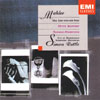Mahler Das Lied von der Erde
View record and artist detailsRecord and Artist Details
Composer or Director: Gustav Mahler
Genre:
Vocal
Label: EMI
Magazine Review Date: 2/1997
Media Format: CD or Download
Media Runtime: 64
Mastering:
Stereo
DDD
Catalogue Number: 556200-2

Tracks:
| Composition | Artist Credit |
|---|---|
| (Das) Lied von der Erde, 'Song of the Earth' |
Gustav Mahler, Composer
City of Birmingham Symphony Orchestra Gustav Mahler, Composer Peter Seiffert, Tenor Simon Rattle, Conductor Thomas Hampson, Baritone |
Composer or Director: Gustav Mahler
Label: Classic Sound
Magazine Review Date: 2/1997
Media Format: CD or Download
Media Runtime: 67
Mastering:
ADD
Catalogue Number: 452 301-2DCS

Tracks:
| Composition | Artist Credit |
|---|---|
| (Das) Lied von der Erde, 'Song of the Earth' |
Gustav Mahler, Composer
Dietrich Fischer-Dieskau, Baritone Gustav Mahler, Composer James King, Tenor Leonard Bernstein, Conductor Vienna Philharmonic Orchestra |
Author:
Decca have just reissued their 1967 Fischer-Dieskau/Bernstein recording with the Vienna Philharmonic, so comparisons with the excellent Thomas Hampson in this brand new Rattle account are especially pertinent – and revealing. Both singers display a startling kinship with their respective conductors. Alongside Leonard Bernstein’s searing subjectivity, Sir Simon seems almost dispassionate. From where he stands, we are already at one remove from this ‘song of the earth’. An air of abstraction (or, if you prefer, ritual detachment), a pure, remote, glacial beauty characterizes the performance. In the very first song, when the poet speaks of the eternal blue sky, it’s the word “eternal” that Rattle seeks to illuminate. His reading seems almost at times to suggest an out-of-body experience. The darkness, the chill of loneliness, desolation, which descends with the opening chord of “Der Abschied” is at once so immediate and so distant. This is an unforgettable sound, unforgettably sounded. It’s that death-rattle of the contra-bassoon coming through the low C on cellos and basses, harps, horns and tam-tam (like everything else here, EMI’s exemplary recording lays it bare with disarming clarity). One note, far-reaching implications. It’s the feeling that throughout this extraordinary setting so much is suggested because so much is left out. Simple music of vast ambiguity. Rattle respects that. He can be passive in a way that Bernstein could not. He can stand back, where Bernstein waded in. He can convey Das Lied’s heartache, longing, lust for life. Bernstein needed to live it.
So, just as surely as Hampson shares Rattle’s innate sense of balance and understatement, Fischer-Dieskau is very much Bernstein’s mouthpiece, animating the text, making the words sing. And therein lies the difference. These things are so personal, of course, but for all the natural beauty of Hampson’s singing, I do find it a shade undercharacterized – particularly in the earlier songs. The cold wind that blows through the second stanza of “Der Einsame im Herbst” is felt as well as heard in Fischer-Dieskau’s colouring of the words “Ein kalter Wind”. Similarly, in the fourth song, “Von der Schonheit”, Hampson’s mellifluous tone may be sufficiently beguiling in itself, but to hear Fischer-Dieskau using words like “pflucken” and “Neckereien” to tantalize the ear at once brings these flower-picking maidens off the willow pattern and into our imaginations.
“Der Abschied”, as I say, is stark and imposing (with Rattle profiling those bass woodwind ‘spectres of the night’ almost as vividly as Bernstein). Hampson’s first entry is exactly as Mahler would have it, “without expression” in the manner of a witness, an observer, the voice of one for whom death is near. Numb and numbing. Later, as the funeral march recedes, the arrival of the poet’s “friend” is again a simple statement of fact, an observation – no more. But it is in moments like this that one begins to recognize that the performance as a whole lacks something: atmosphere. It’s all a bit too pristine. It doesn’t sound lived in, loved in. And it’s hard to define why. The more so since Hampson’s hushed world-weariness (“veiled” as the poet describes the voice of his friend) is so very affecting in the passage ending “Ich suche Ruhe fur mein einsam Herz!” (“I seek rest for my lonely heart”) with its solitary clarinet echo. Bernstein makes more of a meal of it, of course, but it’s enough to break your heart. As is his overdone but searing crescendo on the violins’ E natural which carries us across the C major threshold into “Die liebe Erde”. For some reason, Rattle virtually ignores Mahler’s pause marking here. This, surely isn’t a moment for understatement. But the long goodbye is luminous. The final fading “Ewig... ” really is ppp – no more than a breath, an expiration.
In the tenor songs Peter Seiffert is probably the closest we’ve come in this imperfect world to Fritz Wunderlich (Klemperer) in terms of a lyric/heroic blend. He’s a great advance on Bernstein’s James King who has too much heft and not enough heart. Or finesse (why the pathological fear of his head-voice?). Mind you, a few bars of Julius Patzak (Walter) in the third song, “Von der Jugend” (“Youth”) and suddenly there’s the added irony of a jaundiced old poet looking back with a wink and a smile. My goodness, how the words sparkle there. Walter’s famous performance with Ferrier (just the sound of that voice touches something deep inside us all) remains a uniquely atmospheric document, though Ludwig (for Klemperer) undoubtedly sings it better. So what can I tell you? Das Lied von der Erde remains elusive. Now and forever.'
Discover the world's largest classical music catalogue with Presto Music.

Gramophone Digital Club
- Digital Edition
- Digital Archive
- Reviews Database
- Full website access
From £8.75 / month
Subscribe
Gramophone Full Club
- Print Edition
- Digital Edition
- Digital Archive
- Reviews Database
- Full website access
From £11.00 / month
Subscribe
If you are a library, university or other organisation that would be interested in an institutional subscription to Gramophone please click here for further information.





